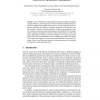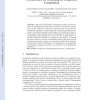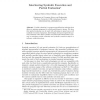113
click to vote
FMCO
2009
Springer
14 years 12 months ago
2009
Springer
Formal modelling is indispensable for engineering highly dependable systems. However, a wider acceptance of formal methods is hindered by their insufficient usability and scalabili...
163
click to vote
FMCO
2009
Springer
14 years 12 months ago
2009
Springer
Abstract. Atomicity Decomposition is a technique in the Event-B formal method, which augments Event-B refinement with additional structuring in a diagrammatic notation to support c...
126
click to vote
FMCO
2009
Springer
14 years 12 months ago
2009
Springer
This paper reviews the model of interactive Markov chains (IMCs, for short), an extension of labelled transition systems with exponentially delayed transitions. We show that IMCs a...
113
click to vote
FMCO
2009
Springer
14 years 12 months ago
2009
Springer
Abstract. The paradigms of service-oriented computing and modeldriven development are becoming of increasing importance in the field of software engineering. According to these par...
121
click to vote
FMCO
2009
Springer
14 years 12 months ago
2009
Springer
The main characteristics of component models is their strict structure enabling better code reuse. Correctness of component composition is well understood formally but existing wor...
154
click to vote
FMCO
2009
Springer
14 years 12 months ago
2009
Springer
Partial evaluation is a program specialization technique that allows to optimize programs for which partial input is known. We show that partial evaluation can be used with advanta...




